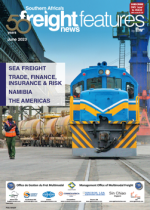Logistics service providers aiming for success in the North American market must showcase their ability to adapt and cater to the diverse needs of customers. To meet and exceed customer requirements and expectations, neutral consolidator SACO CFR has several dynamic solutions for the US.According to trade manager Kreeson Moodley, SACO CFR offers a regular trucking service from the Chicago area directly into its New York CFS (Container Freight Station) as part of this initiative. “This allows cargo to be seamlessly loaded onto our direct services from New York to South Africa. While a direct service from Chicago is already available, transporting cargo by truck to New York presents a significant time-saving advantage for customers with time-sensitive shipments,” he told Freight News.Moreover, he believes SACO CFR goes the extra mile by catering to special requests such as cross-trade and supporting buyers’ consolidations. He explained that by constantly innovating and diversifying its service portfolio, the consolidator ensured it remained a reliable and customer-centric logistics partner.Mark Naidoo, the company’s trade coordinator for exports, said weekly direct services into New York, including inland movements within the US and Canadian region from all base ports in South Africa, were on offer.“We can assist customers with special requests such as DAP and DDU on LCL shipments, leveraging our strong representation in the US through Shipco Transport Inc. This strategic partnership ensures dedicated customer service teams are readily available to deliver customised solutions,” said Naidoo.SACO CFR prioritised transparency and convenience by providing shipment tracking services on the Shipco website, granting customers a clear and comprehensive overview of their shipments around the clock, 24/7, he added.The US market, however, is facing challenges at present. Naidoo said the ongoing surge in cargo volume, combined with labour and equipment shortages, had led to significant delays in the supply chain. “These delays are often a result of vessel delays, which in turn cause port omissions and blank sailings in both South Africa and the US. The nationwide congestion has further exacerbated the situation, leading to widespread chassis shortages across many parts of the US.”The rapid growth of e-commerce, said Moodley, had heightened the need for logistics companies that offered expedited and cost-effective delivery solutions. “It has, however, placed significant pressure on the industry to meet these demands. Unfortunately, rail congestion is a major challenge, causing delays and hindering the seamless f low of goods within the US. Consequently, containers frequently miss the cut-off time for their intended vessels, leading to further disruptions. Additionally, concerns regarding carrier scheduling integrity persist, as frequent schedule changes continue to pose difficulties for stakeholders.

